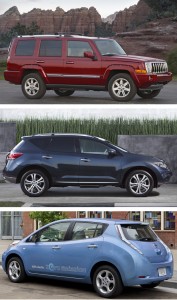
Could there be three more different vehicles on someone's shopping list? the Jeep Commander, top, Nissan Murano and the Nissan Leaf are at completely different ends of the automotive spectrum.
She came to me and said “So you write about cars? Can you give me some advice on what kind of car I should buy?”
Hey, I’m always up for a little car talk.
So she asked if a Jeep Comander really is rated at just 20 mpg. Well, yes, if you opt for the V-6. If you want the V-8, it’s less for this out-of-production behemoth.
Also on her shopping list? Nissan Murano. Then the next day she tells me that she had decided on a Nissan Leaf electric. Are there three more different vehicles on the planet? A full-size, three-row SUV, a swoopy two-row crossover and a full electric small car. Eventually, she’ll probably throw in a Mazda MX-5 just to cover yet another body style.
Did I mention that she has a 160-mile roundtrip commute to work? That drive would far exceed the Leaf’s limited range. Better bring an extension cord.
It all speaks to the trouble consumers seem to have deciding on the right vehicle for their needs. A lot of consumers see a vehicle they like, but don’t think about the ramifications of such a purchase.
Jeep is actually a great example of the problem. Most Jeeps are designed with heavy-duty components so they can stand up to the rigors of off-road use. Too bad most them – almost all of them, in fact – never go anywhere more off-road than a gravel driveway. But buyers like the adventuresome spirit a Jeep portrays. I once had a boss who drove a pristine Jeep Wrangler, the ultimate off-roader. I asked him if he had ever taken it off-road. Not once.
That’s where car designers come in. They draw cars that make people say “I’ve got to have one of those,” even if it doesn’t work for their lifestyle. That essentially fueled the SUV craze of the ‘90s.
So consider this a primer on how to decide what car works best for you.
It’s OK to start by seeing what cars catch your eye on the road. If you know someone who drives one of them, ask what its like.
But that should just be the beginning of your research. The next step is to hit the Internet. Spend time on sites such as TheDetroitBureau.com, reading reviews, checking out specs and learning what each does well and not so well.
But even more important, as you’re looking at vehicles, try to figure out if they work for your lifestyle. If you have a big family and you want to tow a large camper, then a Ford Expeditition makes sense. But if you’re just going to use it for your 50-mile commute by yourself, there are better options.
The new breed of electric vehicles further complicate the matter. Yes, the Leaf is projected to have a 100-mile range once it goes on sale late this year, but that’s under optimum conditions. Traveling at freeway speeds will shorten the range, and extreme temperatures may do the same thing. And if your commute is more than 100 miles roundtrip, will you be able to charge it at work?
Beyond the reviews available in publications and online, spend time perusing the websites of the automakers whose cars you’re looking at. Find out if they’re in your price range. Lot’s of people think they want that cool new BMW, until they see the pricetag.
Be realistic. If you often need to carry a lot of gear for work or play, a wagon or hatchback might be a better choice than a sedan. If you regularly cart around your four teenage sons, all pushing 6 feet, a Mazda5 micro minivan probably won’t be big enough.
In the end, I suggested she look at a small VW diesel. While hybrids and electrics make the most sense in urban settings, diesels are actually at their best on the freeway.
Volkswagen puts it’s small turbodiesel in three cars, the Golf, Jetta and Jetta SportWagen and they’re all rated at 42 mpg highway. On top of that, VW essentially gives the diesel away, pricing it similarly to comparably equipped, gasoline-powered Jettas and Golfs.
What car should you buy? It’s a very personal choice, but doing a little homework will help you make the right decision.

